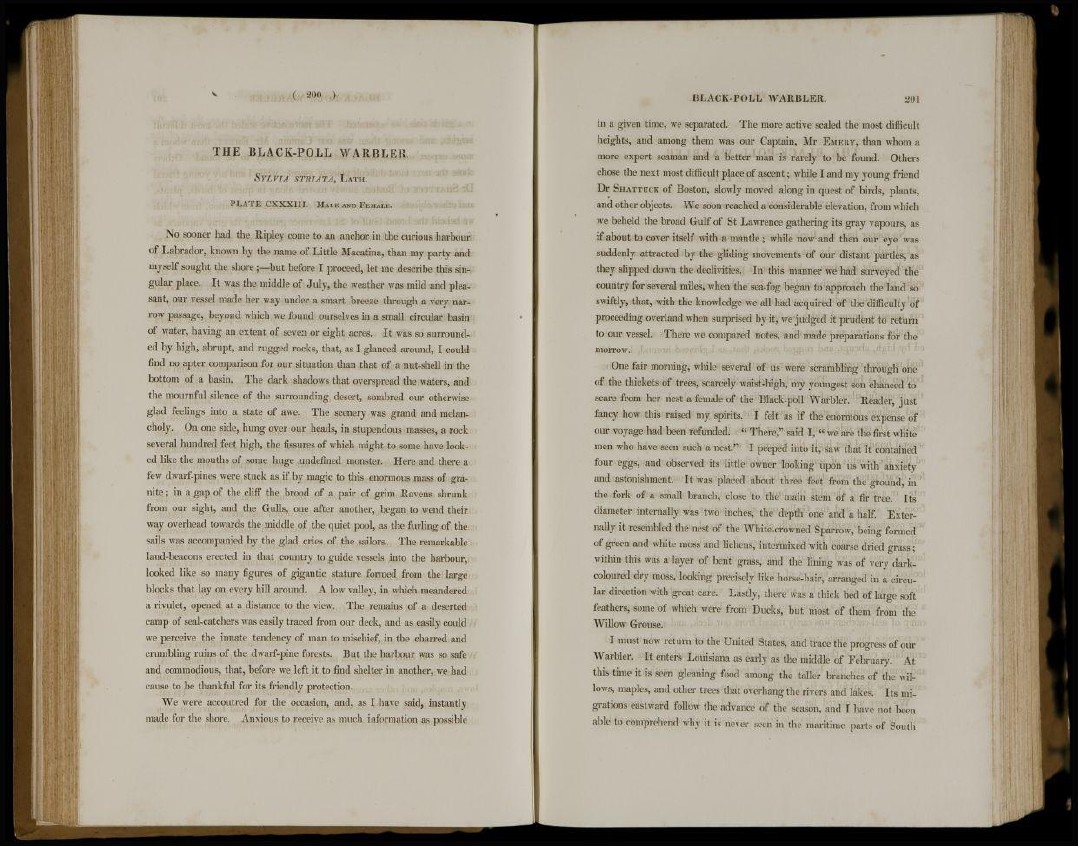
V ( '200 )
T H E B L A C K - P O L L W A R B L E R .
SYLVIA STRIATA, LATH.
P L A T E C X X X 1 I I . MALE A N D F E M A L E .
No sooner had the Ripley come to an anchor in the curious harbour
of Labrador, known by the name of Little Macatina, than my party and
myself sought the shore;—but before I proceed, let me describe this singular
place. It was the middle of July, the weather was mild and pleasant,
our vessel made her way under a smart breeze through a very narrow
passage, beyond which we found ourselves in a small circular basin
of water, having an extent of seven or eight acres. It was so surrounded
by high, abrupt, and rugged rocks, that, as I glanced around, I could
find no apter comparison for our situation than that of a nut-shell in the
bottom of a basin. The dark shadows that overspread the waters, and
the mournful silence of the surrounding desert, sombred our otherwise
glad feelings into a state of awe. The scenery was grand and melancholy.
On one side, hung over our heads, in stupendous masses, a rock
several hundred feet high, the fissures of which might to some have looked
like the mouths of some huge undefined monster. Here and there a
few dwarf-pines were stuck as if by magic to this enormous mass of granite
; in a gap of the cliff the brood of a pair of grim Ravens shrunk
from our sight, and the Gulls, one after another, began to wend their
way overhead towards the middle of the quiet pool, as the furling of the
sails was accompanied by the glad cries of the sailors. The remarkable
land-beacons erected in that country to guide vessels into the harbour,
looked like so many figures of gigantic stature formed from the large
blocks that lay on every hill around. A low valley, in which meandered
a rivulet, opened at a distance to the view. The remains of a deserted
camp of seal-catchers was easily traced from our deck, and as easily could
we perceive the innate tendency of man to mischief, in the charred and
crumbling ruins of the dwarf-pine forests. But the harbour was so safe
and commodious, that, before we left it to find shelter in another, we had
cause to be thankful for its friendly protection.
We were accoutred for the occasion, and, as I have said, instantly
made for the shore. Anxious to receive as much informal ion as possible
BLACK-POLL WARBLER. 201
in a given time, we separated. The more active scaled the most difficult
heights, and among them was our Captain, Mr EMEIIY, than whom a
more expert seaman and a better man is rarely to be found. Others
chose the next most difficult place of ascent; while I and my young friend
Dr SHATTUCK of Boston, slowly moved along in quest of birds, plants,
and other objects. We soon reached a considerable elevation, from which
we beheld the broad Gulf of St Lawrence gathering its gray vapours, as
if about to cover itself with a mantle; while now and then our eye was
suddenly attracted by the gliding movements of our distant parties, as
they slipped down the declivities. In this manner we had surveyed the
country for several miles, when the sea-fog began to approach the land so
swiftly, that, with the knowledge we all had acquired of the difficulty of
proceeding overland when surprised by it, we judged it prudent to return
to our vessel. There we compared notes, and made preparations for the
morrow.
One fair morning, while several of us were scrambling through one
of the thickets of trees, scarcely waist-high, my youngest son chanced to
scare from her nest a female of the Black-poll Warbler. Reader, just
fancy how this raised my spirits. I felt as if the enormous expense of
our voyage had been refunded. " There,'" said I, " we are the first white
men who have seen such a nest.'1 I peeped into it, saw that it contained
four eggs, and observed its little owner looking upon us with anxiety
and astonishment. It was placed about three feet from the ground, in
the fork of a small branch, close to the main stem of a fir tree. Its
diameter internally was two inches, the depth one and a half. Externally
it resembled the nest of the White-crowned Sparrow, being formed
of green and white moss and lichens, intermixed with coarse dried grass;
within this was a layer of bent grass, and the lining was of very darkcoloured
dry moss, looking precisely like horse-hair, arranged in a circular
direction with great care. Lastly, there was a thick bed of large soft
feathers, some of which were from Ducks, but most of them from the
Willow Grouse.
I must now return to the United States, and trace the progress of our
Warbler. It enters Louisiana as early as the middle of February. At
this time it is seen gleaning food among the taller branches of the willows,
maples, and other trees that overhang the rivers and lakes. Its migrations
eastward follow the advance of the season, and I have not been
able to comprehend why it is never seen in the maritime parts of South